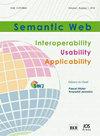CANARD: An approach for generating expressive correspondences based on competency questions for alignment
IF 3
3区 计算机科学
Q2 COMPUTER SCIENCE, ARTIFICIAL INTELLIGENCE
引用次数: 0
Abstract
Ontology matching aims at making ontologies interoperable. While the field has fully developed in the last years, most approaches are still limited to the generation of simple correspondences. More expressiveness is, however, required to better address the different kinds of ontology heterogeneities. This paper presents CANARD (Complex Alignment Need and A-box based Relation Discovery), an approach for generating expressive correspondences that rely on the notion of competency questions for alignment (CQA). A CQA expresses the user knowledge needs in terms of alignment and aims at reducing the alignment space. The approach takes as input a set of CQAs as SPARQL queries over the source ontology. The generation of correspondences is performed by matching the subgraph from the source CQA to the similar surroundings of the instances from the target ontology. Evaluation is carried out on both synthetic and real-world datasets. The impact of several approach parameters is discussed. Experiments have showed that CANARD performs, overall, better on CQA coverage than precision and that using existing same:As links, between the instances of the source and target ontologies, gives better results than exact label matches of their labels. The use of CQA improved also both CQA coverage and precision with respect to using automatically generated queries. The reassessment of the counter-example increased significantly the precision, to the detriment of runtime. Finally, experiments on large datasets showed that CANARD is one of the few systems that can perform on large knowledge bases, but depends on regularly populated knowledge bases and the quality of instance links.CANARD:基于能力问题生成表达性对应关系的方法,用于对齐
本体匹配旨在实现本体的互操作性。虽然该领域在过去几年得到了充分发展,但大多数方法仍局限于生成简单的对应关系。然而,要更好地处理不同类型的本体异质性,还需要更强的表达能力。本文介绍了 CANARD(基于复杂对齐需求和 A-box 的关系发现),这是一种依赖于对齐能力问题(CQA)概念来生成具有表现力的对应关系的方法。CQA 以对齐方式表达用户的知识需求,目的是缩小对齐空间。该方法将一组 CQA 作为源本体的 SPARQL 查询作为输入。通过将源 CQA 的子图与目标本体中实例的相似环境进行匹配,生成对应关系。在合成数据集和真实数据集上都进行了评估。讨论了若干方法参数的影响。实验表明,总体而言,CANARD 在 CQA 覆盖率方面的表现优于精确度,而且在源本体和目标本体的实例之间使用现有的 same:As 链接,会比它们的标签的精确标签匹配产生更好的结果。与使用自动生成的查询相比,使用 CQA 也提高了 CQA 覆盖率和精确度。对反例的重新评估显著提高了精确度,但对运行时间造成了损害。最后,在大型数据集上进行的实验表明,CANARD 是少数几个能在大型知识库上运行的系统之一,但这取决于定期填充的知识库和实例链接的质量。
本文章由计算机程序翻译,如有差异,请以英文原文为准。
求助全文
约1分钟内获得全文
求助全文
来源期刊

Semantic Web
COMPUTER SCIENCE, ARTIFICIAL INTELLIGENCEC-COMPUTER SCIENCE, INFORMATION SYSTEMS
CiteScore
8.30
自引率
6.70%
发文量
68
期刊介绍:
The journal Semantic Web – Interoperability, Usability, Applicability brings together researchers from various fields which share the vision and need for more effective and meaningful ways to share information across agents and services on the future internet and elsewhere. As such, Semantic Web technologies shall support the seamless integration of data, on-the-fly composition and interoperation of Web services, as well as more intuitive search engines. The semantics – or meaning – of information, however, cannot be defined without a context, which makes personalization, trust, and provenance core topics for Semantic Web research. New retrieval paradigms, user interfaces, and visualization techniques have to unleash the power of the Semantic Web and at the same time hide its complexity from the user. Based on this vision, the journal welcomes contributions ranging from theoretical and foundational research over methods and tools to descriptions of concrete ontologies and applications in all areas. We especially welcome papers which add a social, spatial, and temporal dimension to Semantic Web research, as well as application-oriented papers making use of formal semantics.
 求助内容:
求助内容: 应助结果提醒方式:
应助结果提醒方式:


